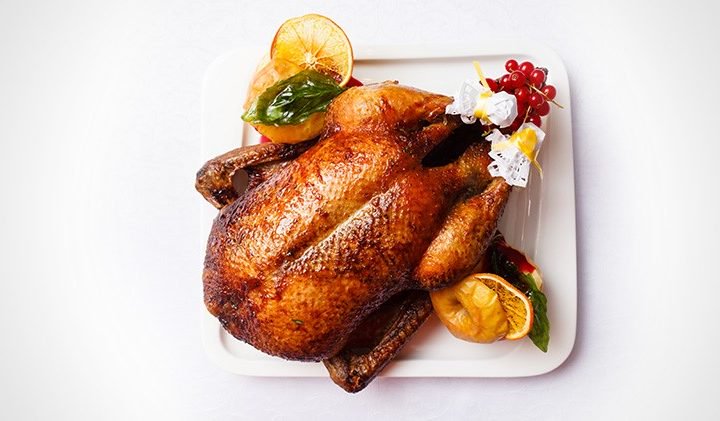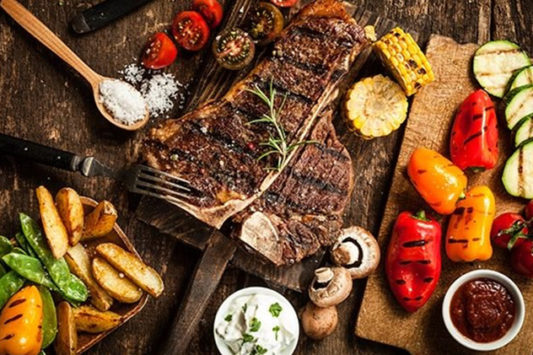It seems like an inevitable part of our Christmas festivities that we are going to pile on a few unwanted pounds; after all we’re constantly surrounded by delicious food and drink. The ‘easy’ thing to do when talking about staying in good shape at Christmas is to talk about things like eating in moderation (whatever moderation actually is?!), still getting plenty of exercise and trying to limit yourself to the occasional treat… which is all good advice, BUT there are other things we can do so we don’t have to resist temptation and take away some of the unwanted and often unnecessary guilt many people feel at this time of year.
The thing many people in fitness forget is that food is often so much more than just energy, it has serious cultural and social significance and at Christmas, it is, for many people a time to sit and enjoy each other’s company around the dinner table, in front of the television or down the pub over a few drinks. You shouldn’t have to miss out on this or worry about what you eat. This doesn’t however mean that you shouldn’t plan ahead.
The key I have found personally over the years is to use Christmas and New Year as a diet break. This may sound at loggerheads with your goals but there is some evidence to suggest that breaks in a diet and the occasional week off on higher calories is not going to do that much harm and might actually be of benefit1, not just at Christmas but at any time when dieting throughout the year… as long as we don’t go to ‘ridiculous’ levels of excess.
This means in the period leading up to Christmas we might want to reduce our calories a bit more and really pay special attention to making sure we increase our output so that we are in a position to relax a little bit and not have to feel guilty about dipping in to the tin of Quality Street now and again. The important thing here though is to come to terms psychologically with this so that when you do gain a few pounds, it is part of the long term program and it is not going to take you back to square one unless you do something exceptionally silly!
Depending on your training style and volume, a week out the gym to let the body recover might be a good idea, so one strategy might be to really ramp up your training volume until Christmas to achieve what is called ‘functional over reaching’2. This is different to over training as this is an intentional increase in training volume so that you are struggling to recover and your performance in the gym actually starts to dip. If we time this with coming into the Christmas period then when we ‘de-load’ and take time out the gym the body will recover with the extra fuel and time off.
It is not uncommon to come back in the New Year much, much stronger and with any little injuries healed up. This is such an effective strategy that is actually used with strength athletes leading up to a competition to peak at the right time.
For those people who are really worried about unwanted weight regain, especially those who have struggled to lose it, then we can still enjoy food but we are going to want to be a bit more considered and ‘pick our battles’… we can do this in a few ways.
Firstly, we can focus on restricting our excessive days to the ‘big four’; Christmas day, Boxing Day, New Year’s Eve and New Year’s Day, whilst adding in a few lower calorie days in between to balance things out. Remember, it is our weekly and monthly averages that determine our long term weight, so we can balance higher days with lower days to maintain our current levels of body fat.
With extra time off, there is also plenty of scope to increase our output. This doesn’t have to necessarily be hitting the gym more often, but getting into good habits like going for a walk every morning, walking to friends and families instead of driving everywhere, are great ways to increase our calorie expenditure and off-set some of the extra calories we eat. Obviously this can be challenging if the weather isn’t great, but you could always ask for a new coat for Christmas to help you on your way!
Secondly, in our main meals where we’re likely to overindulge focus on making sure you eat plenty of protein and veg and filling up on the good stuff before dessert may be of some help. In reality though, most of the extra calories we consume are more likely to come from grazing, snacking and drinking. You could try snacking on our protein snacks to get a protein bonus when you feel peckish!
Finally, there are of course the more obvious ways to save calories. Swapping sugary soft drinks for diet alternatives, focusing on lower calorie alcohol and mixers that don’t have to take away from you joining in. If you really want to be keep a tight rein on things then choose lower calorie snacks such as popcorn over peanuts and vegetable sticks with ‘light’ versions of dips.
I don’t think anyone should have to miss out over Christmas and they should be able to snack on chocolate, graze on nibbles and enjoy food and time with friends and family without feeling guilty.
Importantly, there is more than one way to limit any unwanted damage, be that to compensate before Christmas, factor in lower days around Christmas, concentrating on increasing your energy expenditure, being a bit more conscientious about food choices or combining a little bit of all these strategies so that your Christmas can be enjoyable and still keep you on track with your current long term goals.
References
1.) Keogh et al, (2014) Effects of intermittent compared to continuous energy restriction on short-term weight loss and long-term weight loss maintenance. Clinical Obesity 4(3): 150-156.
2.) Aubry et al. (2014) Functional Overreaching: The Key to Peak Performance during the Taper? Medicine and Science in Sports and Exercise 46 (9):1769-1777.



